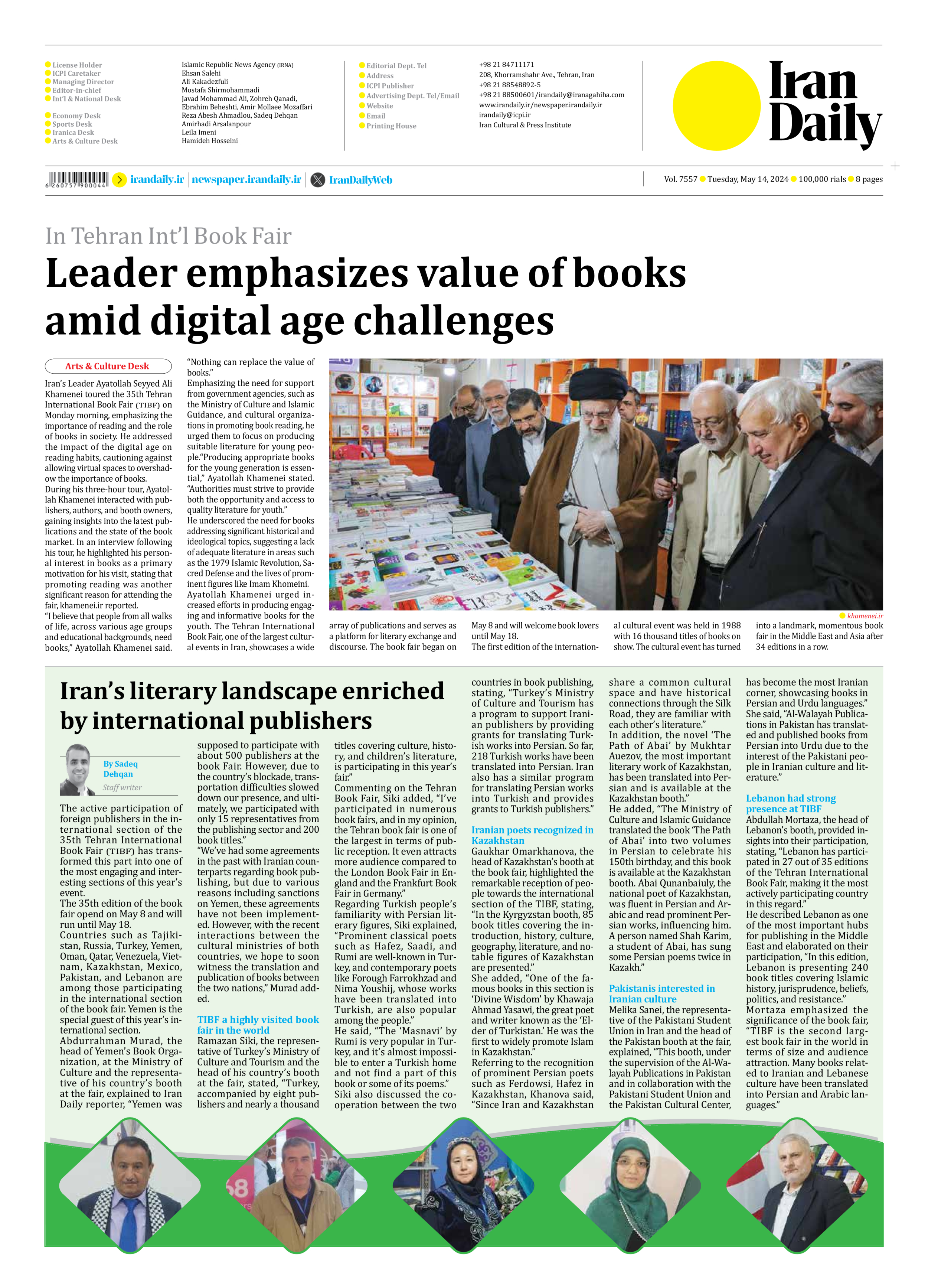
Iran’s literary landscape enriched by international publishers
By Sadeq
Dehqan
Staff writer
The active participation of foreign publishers in the international section of the 35th Tehran International Book Fair (TIBF) has transformed this part into one of the most engaging and interesting sections of this year’s event.
The 35th edition of the book fair opend on May 8 and will run until May 18.
Countries such as Tajikistan, Russia, Turkey, Yemen, Oman, Qatar, Venezuela, Vietnam, Kazakhstan, Mexico, Pakistan, and Lebanon are among those participating in the international section of the book fair. Yemen is the special guest of this year’s international section.
Abdurrahman Murad, the head of Yemen’s Book Organization, at the Ministry of Culture and the representative of his country’s booth at the fair, explained to Iran Daily reporter, “Yemen was supposed to participate with about 500 publishers at the book Fair. However, due to the country’s blockade, transportation difficulties slowed down our presence, and ultimately, we participated with only 15 representatives from the publishing sector and 200 book titles.”
“We’ve had some agreements in the past with Iranian counterparts regarding book publishing, but due to various reasons including sanctions on Yemen, these agreements have not been implemented. However, with the recent interactions between the cultural ministries of both countries, we hope to soon witness the translation and publication of books between the two nations,” Murad added.
TIBF a highly visited book fair in the world
Ramazan Siki, the representative of Turkey’s Ministry of Culture and Tourism and the head of his country’s booth at the fair, stated, “Turkey, accompanied by eight publishers and nearly a thousand titles covering culture, history, and children’s literature, is participating in this year’s fair.”
Commenting on the Tehran Book Fair, Siki added, “I’ve participated in numerous book fairs, and in my opinion, the Tehran book fair is one of the largest in terms of public reception. It even attracts more audience compared to the London Book Fair in England and the Frankfurt Book Fair in Germany.”
Regarding Turkish people’s familiarity with Persian literary figures, Siki explained, “Prominent classical poets such as Hafez, Saadi, and Rumi are well-known in Turkey, and contemporary poets like Forough Farrokhzad and Nima Youshij, whose works have been translated into Turkish, are also popular among the people.”
He said, “The ‘Masnavi’ by Rumi is very popular in Turkey, and it’s almost impossible to enter a Turkish home and not find a part of this book or some of its poems.”
Siki also discussed the cooperation between the two countries in book publishing, stating, “Turkey’s Ministry of Culture and Tourism has a program to support Iranian publishers by providing grants for translating Turkish works into Persian. So far, 218 Turkish works have been translated into Persian. Iran also has a similar program for translating Persian works into Turkish and provides grants to Turkish publishers.”
Iranian poets recognized in Kazakhstan
Gaukhar Omarkhanova, the head of Kazakhstan’s booth at the book fair, highlighted the remarkable reception of people towards the international section of the TIBF, stating, “In the Kyrgyzstan booth, 85 book titles covering the introduction, history, culture, geography, literature, and notable figures of Kazakhstan are presented.”
She added, “One of the famous books in this section is ‘Divine Wisdom’ by Khawaja Ahmad Yasawi, the great poet and writer known as the ‘Elder of Turkistan.’ He was the first to widely promote Islam in Kazakhstan.”
Referring to the recognition of prominent Persian poets such as Ferdowsi, Hafez in Kazakhstan, Khanova said, “Since Iran and Kazakhstan share a common cultural space and have historical connections through the Silk Road, they are familiar with each other’s literature.”
In addition, the novel ‘The Path of Abai’ by Mukhtar Auezov, the most important literary work of Kazakhstan, has been translated into Persian and is available at the Kazakhstan booth.”
He added, “The Ministry of Culture and Islamic Guidance translated the book ‘The Path of Abai’ into two volumes in Persian to celebrate his 150th birthday, and this book is available at the Kazakhstan booth. Abai Qunanbaiuly, the national poet of Kazakhstan, was fluent in Persian and Arabic and read prominent Persian works, influencing him. A person named Shah Karim, a student of Abai, has sung some Persian poems twice in Kazakh.”
Pakistanis interested in
Iranian culture
Melika Sanei, the representative of the Pakistani Student Union in Iran and the head of the Pakistan booth at the fair, explained, “This booth, under the supervision of the Al-Walayah Publications in Pakistan and in collaboration with the Pakistani Student Union and the Pakistan Cultural Center, has become the most Iranian corner, showcasing books in Persian and Urdu languages.”
She said, “Al-Walayah Publications in Pakistan has translated and published books from Persian into Urdu due to the interest of the Pakistani people in Iranian culture and literature.”
Lebanon had strong
presence at TIBF
Abdullah Mortaza, the head of Lebanon’s booth, provided insights into their participation, stating, “Lebanon has participated in 27 out of 35 editions of the Tehran International Book Fair, making it the most actively participating country in this regard.”
He described Lebanon as one of the most important hubs for publishing in the Middle East and elaborated on their participation, “In this edition, Lebanon is presenting 240 book titles covering Islamic history, jurisprudence, beliefs, politics, and resistance.”
Mortaza emphasized the significance of the book fair, “TIBF is the second largest book fair in the world in terms of size and audience attraction. Many books related to Iranian and Lebanese culture have been translated into Persian and Arabic languages.”







